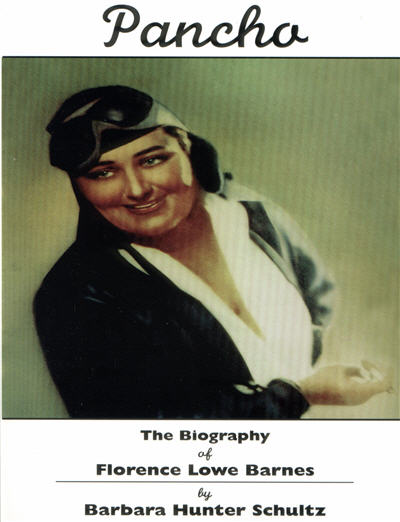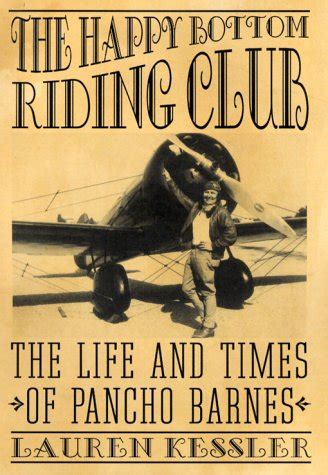Pancho
Barbara Hunter Schultz (1996)
and
The Happy Bottom Riding Club
Lauren Kessler (2000)
"Aw, hell. We had more fun in a week than those weenies had in a lifetime."
In October 1928, Pancho teamed up with Slim Zaunmuller, a young parachutist she met at Baldwin Park, to form the Pancho Barnes Mystery Circus of the Air. She performed aerobatics over Sunday afternoon audiences while Slim perused the bleachers for a good-looking young lady ready for her first parachute jump. Having found a willing beauty, Pancho took Slim and the jumper up to an altitude of 2,000 feet. Pancho then did an inside loop, dumping the fledgling parachutist out of the airplane. (62)
[Pancho:] "Pull a trick like that today and you'd be sued by everybody including the Supreme Court." (63)
Toilet paper cutting is a game in which the pilot drops an unwrapped roll of toilet paper out of the airplane, holding on to one end of the paper so that it will start unwinding. The pilot then begins to fly the airplane past the unrolling paper as many times as he can in order to cute the paper with the plane's wing. (63n.)

She painted "Mexico or Bust" and a foaming beer mug on the side of her Travel Air. Near the cockpit, she stenciled her name and the words, "Who Cares." (78)

One role which Pancho played better than any other was that of hostess. Literally hundreds of guests filtered through her home. They were mostly pilots and movie stars. The stars came to be seen. The pilots just had fun. Her guest book overflowed with names of the famous and those on their way—Bette Davis, Gigi Parish, Zazu Pitts, Dick Cornell, Gary Cooper, John Wayne, the Beery brothers, Leo Carrillo, Will Rogers, W. C. Fields, Jack Maddux, and Richard Arlen—to name a few. (88)
Marya [Caraman] happily took Pancho's ideas and wrote them down in a readable script. This enabled Pancho to submit a short, well-edited manuscript to a soceity magazine. ... The fellow profusely complimented Pancho on her style by saying, "This stuff is really good! I didn't know that you could write so well." Pancho accepted the kudos of being a successful writer, never acknowledging the fact that she owed her accomplishments to a "ghost writer." Marya's response, "She kidded herself that way." Pancho later attempted to write a novel entitled Okay, Death, something she said every time she went flying. (93)
Amarillo's local newspaper carried an interesting article on Pancho:
"Pancho Barnes, wife of an Episcopalian bishop, carried a huge cigar in one corner of her mouth as she dismounted from the plane. In answer to a question, the young woman declared she hails from California but prefers Tucson, Arizona where men are men and women are glad of it." (100)
Navigating into bad weather was the only part of flying that caused Pancho any apprehension. ... "What I'm really afraid of is flying and being anywhere near a cloud. A stuffed cloud is a cloud with a mountain in it." (121)
"It is all very well I suppose, to hang by my toes while several billion dollars' worth of government malfunction churns slowly, like a lazy squirrel in a wheel. But I don't like it, and the situation is not going to be any easier for you or the Air Force." (187)

Florence's mother came to the shows, gasping audibly each time her daughter rode a horse over a jump. Florence could hear it from the stands, and it annoyed her every time. (33)
For a while, a strapping young man from Iowa camped out at San Marino, too. He was playing football for USC on scholarship and having trouble making ends meet. His name was Marion Morrison, and he kept a German shepherd named Duke by his side. (39)
One evning she and a few friends were sharing travel stories around the bar in the basement of her Laguna Beach home when someone suggested that they all hire on as crew aboard a South America-bound vessel. It was one of those late-night, alcohol-fueled schemes that usually go nowhere, only this time it went somewhere. (41)
In Mexico, on foot in the backcountry, on tramp steamers in the Gulf, eating what could be scrounged, sleeping on a serape laid on bare earth, she had lived like a peasant, not a society woman, and she had not only survived, she had had the time of her life. Money was wonderful, she loved having it, but the Mexican trip taught her she could live without it if she had to. (45)
Pancho had grown up rich in a cloistered, mannered society and had spent enormous energy stripping away the finish of that life. She was, at thirty-four, a woman who loved to tell dirty jokes and hated to take a bath, a woman who challenged men to arm-wrestle and then took them as lovers. The desert might be just the place for her. (107)
The Hannam place asn't much: a small shack by the narrow two-lane highway, a four-room house up a rutted dirt road, and a hay barn. The land was flat and treeless, dusty khaki and dun-colored where the alfalfa wasn't growing. It looked like "the ass end of the moon," one of Pancho's friends said, and it was almost as isolated. (113)
The first homesteaders had not arrived until 1910, an intrepid couple named Clifford and Effie Corum who were determined to start a farm community in the desert wasteland. ... They wanted to name the tiny community after themselves, Corum, but postal authorities objected because California already had a Coram. The couple countered with Muroc, Corum spelled backward, and that's what the settlement came to be called. (114)
Despite all the talk, and despite Pancho's strikingly unfeminine behavior, she was generally well liked by her neighbors. She was a character in a land that appreciated characters. (125)
Pancho loved shocking the people to whom others would have deferred: generals, Hollywood personalities, millionaires. She loved actively, purposefully creating what would become the legends of the Happy Bottom Riding Club, stories she and others would tell later, many times, embellishing even the seemingly unembellishable. (180)
But mostly she didn't renew her license out of a combination of defiance and annoyance. The rules and regulations for flying and licensing had become increasingly complex during her decades as a pilot, and she hated the forms and the bureaucrats and the way flying seemed to have been taken over by desk jockeys who had never seen the inside of a cockpit. Back in the days before the federal government had become involved in controlling the skies, Pancho had known and flown with everyone. It was a small world, a free-for-all world that celebrated risks and courted dangers, winked at idiosyncrasies and venerated individualism. That world, her world, was disappearing, and Pancho did not want to admit it. She did not want to become part of the new order. Flying without a pilot's license was her brand of protest. (186)
When she wasn't flying off to Mexico, Pancho was entertaining a growing number of Hollywood celebrities at the ranch. The list of regulars included Errol Flynn, Tyrone Power, Dick Powell, Veronica Lake, Nicky Hilton and Elizabeth Taylor, Danny Kaye, Shelly Winters—even Lassie. (187)
Edgar Bergen came out to the club to entertain, taking the train from Hollywood to Lancaster and waiting at the station for Pancho to pick him up. When she showed up one too many times in a ranch truck or a ramshackle car, he complained, half seriously, that it "just wasn't fitting." The next time Pancho was in town, she went to the car dealership and bought a luxurious new Cadillac Fleetwood. On the way back to the ranch, she remembered she needed some hay. She stopped at the feed store, took out the car's back seat, and loaded up. She never bothered to put the seat back in. When she went to pick up Bergen a few weeks later, she ushered him into the back of the impressive new car, where he sat on what remained of a bale of hay. (187)
It's hard to know how she found the time, but Pancho began a new—if abbreviated—career in the early 1950s: songwriting. She did not have an overwhelming talent. Her lyrics tended toward the banal; her tunes were unsophisticated. But she showed her usual fearlessness in trying something new, the character trait that separated her from most others. (188)
At least nine of her songs were recorded, many by Stan Worth and His Orchestera or by the Kings Four, both successful and well-known bands on the Los Angeles scene. "Moon Crazy," one of her favorites, a song regularly sung around the piano at the bar, was recorded several times and sung on national television. Songs like "Hello, Heaven," "Yippee It's Rodeo Day," "You Can't Get Me Down, Down, Down," and "Turn That Page," a New Year's ditty, words and music by Pancho Barnes, were full of spirit and optimism. (188-9)
Edwards [Air Force Base] and its leadership were changing, aviation was changing, and something even closer to home was changing: home itself, the little settlement of Muroc, the desert outpost Pancho and a handful of ranchers and farmers had made their own. The postal service changed the mailing address to "Edwards" and, literally overnight, Muroc officially ceased to exist. The action had a practical purpose but was also symbolic, a heavy-handed message issued special delivery to the old homesteaders: Move over, Muroc. Edwards was in charge now. (195)
The trial itself was, if not exactly a circus, then certainly one of the livelier legal happenings of the year. Once again acting as her own attorney, Pancho came to court dressed in cowboy boots, riding britches, and colorful Western shirts purchased from Barry Goldwater's exclusive cattle-country dude store in Phoenix. (210)
In February 1953, with all three cases pending, the government turned the tables and took the offensive. Pancho, who had been in control of the action, who had been the filer of suits, now became the defendant in a government-initiated suit ominously and impersonally entitled The United States of America v. 360 Acres of Land. (213-14)
People shook their heads and talked about what a character she was. "Most people are as alike as rabbit turds," Roger Chute wrote to one of his friends. But "no system of conformance, no all-embracing plan of regimentation, no demented concept of unvarying mediocrity ever produced a human phenomenon such as Pancho." (238)
One day a friend drove her into Los Angeles, where her movie connections got her into the commissary at Universal Studios. She was just tucking into a free meal when a big guy came up and put his hand on her shoulder.
"Pancho, do you remember me?" the big guy asked. She looked up at him for a moment.
"Yes, you're Marion Morrison," she said.
"I'm more than that," the big guy said. "I'm John Wayne." The Duke had camped out at Pancho's Pasadena mansion back in the mid-1920s, when he was a USC student on a football scholarship. She gave him another quick look.
"Well, big fuckin' deal," she said. "Now let me finish my lunch." (258)
|



